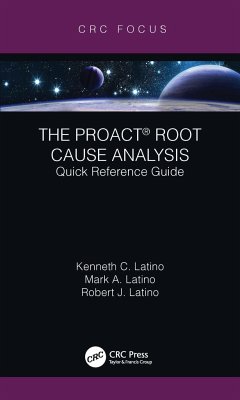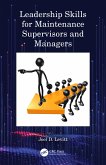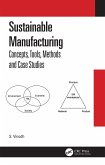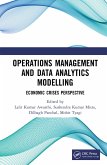Kenneth C Latino, Mark A Latino, Robert J Latino
The PROACT(R) Root Cause Analysis
Quick Reference Guide
Kenneth C Latino, Mark A Latino, Robert J Latino
The PROACT(R) Root Cause Analysis
Quick Reference Guide
- Gebundenes Buch
- Merkliste
- Auf die Merkliste
- Bewerten Bewerten
- Teilen
- Produkt teilen
- Produkterinnerung
- Produkterinnerung
Why don't things always go as planned? When our actual plans deviate from our intended plans, we usually experience some type of undesirable or unintended outcome. This book explores the anatomy of a failure (undesirable outcome) and provides a guide to conducting a comprehensive root cause analysis.
Andere Kunden interessierten sich auch für
![Leadership Skills for Maintenance Supervisors and Managers Leadership Skills for Maintenance Supervisors and Managers]() Joel D LevittLeadership Skills for Maintenance Supervisors and Managers159,99 €
Joel D LevittLeadership Skills for Maintenance Supervisors and Managers159,99 €![Quality Engineering Techniques Quality Engineering Techniques]() Ramin RostamkhaniQuality Engineering Techniques222,99 €
Ramin RostamkhaniQuality Engineering Techniques222,99 €![Reliability, Maintainability, and Safety for Engineers Reliability, Maintainability, and Safety for Engineers]() B S DhillonReliability, Maintainability, and Safety for Engineers181,99 €
B S DhillonReliability, Maintainability, and Safety for Engineers181,99 €![Sustainable Manufacturing Sustainable Manufacturing]() S. VinodhSustainable Manufacturing222,99 €
S. VinodhSustainable Manufacturing222,99 €![Industrial Maintenance Industrial Maintenance]() José BaptistaIndustrial Maintenance114,99 €
José BaptistaIndustrial Maintenance114,99 €![Operations Management and Data Analytics Modelling Operations Management and Data Analytics Modelling]() Operations Management and Data Analytics Modelling157,99 €
Operations Management and Data Analytics Modelling157,99 €![Handbook of 3D Printing in Pharmaceutics Handbook of 3D Printing in Pharmaceutics]() Handbook of 3D Printing in Pharmaceutics225,99 €
Handbook of 3D Printing in Pharmaceutics225,99 €-
-
-
Why don't things always go as planned? When our actual plans deviate from our intended plans, we usually experience some type of undesirable or unintended outcome. This book explores the anatomy of a failure (undesirable outcome) and provides a guide to conducting a comprehensive root cause analysis.
Hinweis: Dieser Artikel kann nur an eine deutsche Lieferadresse ausgeliefert werden.
Hinweis: Dieser Artikel kann nur an eine deutsche Lieferadresse ausgeliefert werden.
Produktdetails
- Produktdetails
- Verlag: Taylor & Francis Ltd (Sales)
- Seitenzahl: 82
- Erscheinungstermin: 11. September 2020
- Englisch
- Abmessung: 218mm x 140mm x 10mm
- Gewicht: 272g
- ISBN-13: 9780367517380
- ISBN-10: 0367517388
- Artikelnr.: 59990843
- Herstellerkennzeichnung
- Produktsicherheitsverantwortliche/r
- Europaallee 1
- 36244 Bad Hersfeld
- gpsr@libri.de
- Verlag: Taylor & Francis Ltd (Sales)
- Seitenzahl: 82
- Erscheinungstermin: 11. September 2020
- Englisch
- Abmessung: 218mm x 140mm x 10mm
- Gewicht: 272g
- ISBN-13: 9780367517380
- ISBN-10: 0367517388
- Artikelnr.: 59990843
- Herstellerkennzeichnung
- Produktsicherheitsverantwortliche/r
- Europaallee 1
- 36244 Bad Hersfeld
- gpsr@libri.de
Kenneth C. Latino is Reliability Champion of MeadWestvaco in Covington, Virginia. He has a bachelor of science degree in computerized information systems from Virginia Commonwealth University. He began his career developing and maintaining maintenance software applications in the continuous process industries. After working with clients to help them become more proactive in their maintenance activities, he began consulting and teaching industrial plants how to implement reliability methodologies and techniques to help improve the overall performance of plant assets. Over the past few years, a majority of Kenneth's focus has centered around developing reliability approaches with a heavy emphasis on Root Cause Analysis (RCA). He has trained thousands of engineers and technical representatives on how to implement a successful RCA strategy at their respective facilities. He has co-authored two RCA training seminars: one for engineers and another for hourly personnel. Kenneth is also co-software designer of the RCA program entitled the PROACT Suite. PROACT was a National Gold Medal Award winner in Plant Engineering's 1998 and 2000 Product of the Year competition for it first two versions on the market. He is currently president of the Practical Reliability Group, a Reliability consulting firm dedicated to delivering approaches and solutions that can be practically applied in any asset-intensive industry. Mark A. Latino is president of Reliability Center, Inc. (RCI). Mark came to RCI after 19 years in corporate America. During those years, a wealth of reliability, maintenance, and manufacturing experience was acquired. He worked for Weyerhaeuser Corporation in a production role during the early stages of his career. He had an active part in Allied Chemical Corporation's (now Honeywell) Reliability Strive for Excellence initiative that was started in the 1970s to define, understand, document, and live the Reliability culture until he left in 1986. Mark spent 10 years with Philip Morris primarily in a production capacity that later ended in a Reliability Engineering role. Mark is a graduate of Old Dominion University and has a bachelor's degree in business that focused on production and operations management. Robert J. Latino is CEO of Reliability Center, Inc. (RCI). RCI is a reliability consulting firm specializing in improving equipment, process, and human reliability. He received his bachelor's degree in business administration and management from Virginia Commonwealth University. Robert has been facilitating RCA and FMEA analyses with his clientele around the world for over 20 years and has taught over 10,000 students in the PROACT® methodology. He is co-author of numerous seminars and workshops on FMEA and RCA as well as co-designer of the award winning PROACT Suite Software Package. Robert is a contributing author of Error Reduction in Healthcare: A Systems Approach to Improving Patient Safety and The Handbook of Patient Safety Compliance: A Practical Guide for Health Care Organizations. Robert has also published a paper entitled, "Optimizing FMEA and RCA Efforts in Healthcare" in the ASHRM Journal and presented a paper entitled, "Root Cause Analysis Versus Shallow Cause Analysis: What's the Difference?" at the ASHRM 2005 National Conference in San Antonio, Texas. He has been published in numerous trade magazines on the topic of reliability, FMEA, and RCA and is also a frequent speaker on the topic at domestic and international trade conferences. Robert has also applied the PROACT methodology to the field of Terrorism and Counter Terrorism via a published paper entitled, "The Application of PROACT RCA to Terrorism/Counter Terrorism Related Events."
1. The PROACT RCA Methodology Overview. 2. Preserving Event Data. 3.
Organizing the RCA Team. 4. Analyzing the Data: Introducing the PROACT®
Logic Tree. 5. Communicate Findings & Recommendations. 6. Tracking for
Bottom-Line Performance. 7. Case Study (A3 Report Format).
Organizing the RCA Team. 4. Analyzing the Data: Introducing the PROACT®
Logic Tree. 5. Communicate Findings & Recommendations. 6. Tracking for
Bottom-Line Performance. 7. Case Study (A3 Report Format).
1. The PROACT RCA Methodology Overview. 2. Preserving Event Data. 3.
Organizing the RCA Team. 4. Analyzing the Data: Introducing the PROACT®
Logic Tree. 5. Communicate Findings & Recommendations. 6. Tracking for
Bottom-Line Performance. 7. Case Study (A3 Report Format).
Organizing the RCA Team. 4. Analyzing the Data: Introducing the PROACT®
Logic Tree. 5. Communicate Findings & Recommendations. 6. Tracking for
Bottom-Line Performance. 7. Case Study (A3 Report Format).








